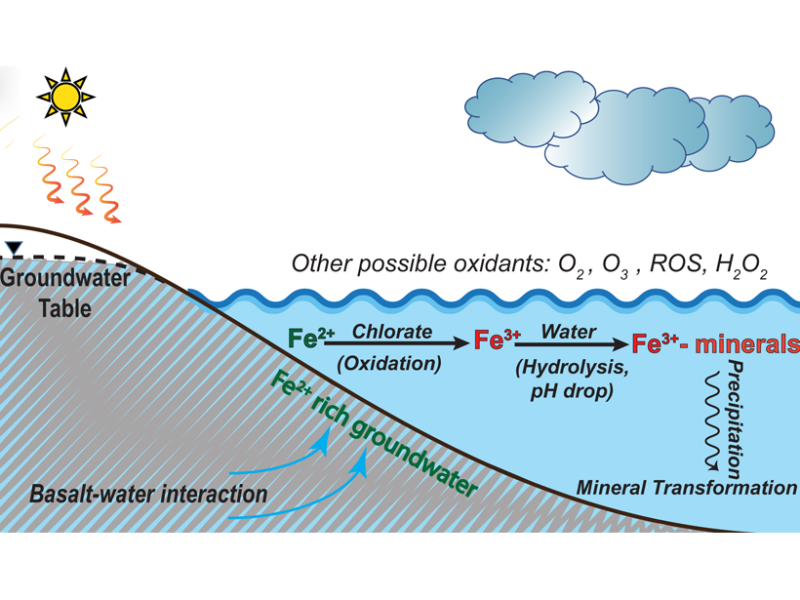Why Is the Red Planet Red? Chlorate May Oxidize Mars' Surface
Laboratory experiments and geochemical model suggest that chlorate is very effective to oxidize reducing iron to reddish iron oxides on Mars when liquid water was present on the surface.
SOURCE: Journal of Geophysical Research: Planets

Chlorate can oxidize reducing iron to iron oxides in various aqueous environments on Mars. These environments include lakes on early Mars, where reducing iron was supplied through mineral dissolution and, then, was oxidized by chlorate to form iron-oxide deposits. Credit: Mitra and Catalano [2019], Figure 8a
Why is the red planet red? It is well known that it is iron oxides that color Mars' surface a reddish tint; however, the process(es) responsible for the oxidation of iron on Mars remain unknown.
Based on laboratory experiments, Mitra and Catalano [2019] provide a new insight into oxidation of iron on Mars. They focus on oxychlorine species, salts of chlorine and oxygen, that are globally distributed on Mars. Having compared with other oxidants, such as molecular oxygen, they suggest that chlorate, one of oxychlorine species, was effective to oxidize reducing iron in various aqueous environments on Mars.
Since life usually requires an oxidant to obtain energy, the presence of effective oxidant, such as chlorate, on early Mars also has strong implications for its habitability.
Citation: Mitra, K., & Catalano, J. G. [2019]. Chlorate as a potential oxidant on Mars: Rates and products of dissolved Fe(II) oxidation. Journal of Geophysical Research: Planets, 124. https://doi.org/10.1029/2019JE006133
—Yasuhito Sekine, Associate Editor, JGR: Planets
AGU发布最新国外工作学习机会:
1. Postdoctoral Scholar Opportunity at the Climate Physics Group, UC Davis and LBNL
The Climate Physics Group at UC Davis and LBNL is seeking a postdoctoral scholar to study atmospheric convection and climate change.
2. Postdoctoral Research Scholar in Remote Sensing
Tempe, Arizona
Arizona State University-School of Geographical Sciences and Urban Planning
Postdoc to work on NSF-sponsored award involving Near Term Forecasts of Global Plant Distribution, Community Structure, and Ecosystem Function.
https://findajob.agu.org/job/8011768/postdoctoral-research-scholar-in-remote-sensing/
3. 15 PhD Positions are Available for Highly Motivated ESR's at GMOS-Train H2020 MSCA ITN Project
Slovenia (SI)
Jožef Stefan Institute - Department of Environmental Sciences
15 ESR positions are open to train a new generation of environmental scientists who will work on research topics of great global importance.
4. PhD Studentship
Wellington, New Zealand
Salary is standard for NZ PhD Students: approx. $28,000 tax free.
Victoria University of Wellington, School of Geography Environment and Earth Sciences
PhD Opportunities: Tropical South Pacific Palaeoclimate
How did the tropical South Pacific respond to rapid glacial climate changes? Reconstructing tropical circulation using speleothems.
https://findajob.agu.org/job/8011753/phd-studentship/
5. EOAS Institute Postdoctoral Associate, Rutgers University
New Brunswick, New Jersey
Commensurate With Experience
Rutgers University, Institute of Earth, Ocean, and Atmospheric Sciences
Rutgers EOAS invites applications for two postdoctoral associates, beginning Fall 2020.
https://findajob.agu.org/job/8011707/eoas-institute-postdoctoral-associate-rutgers-university/



